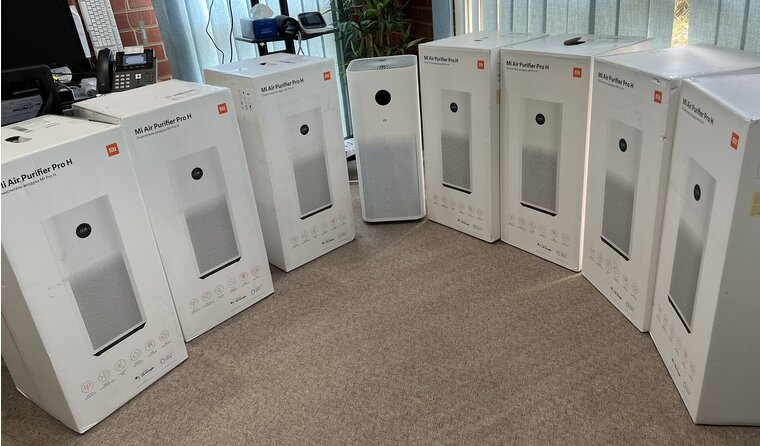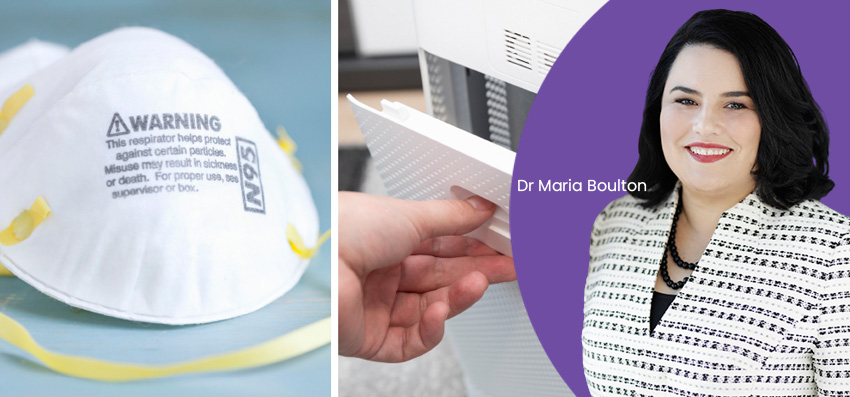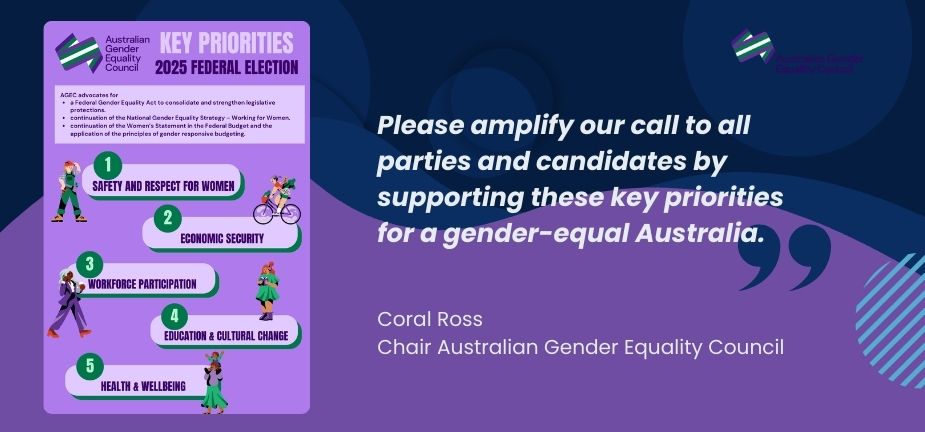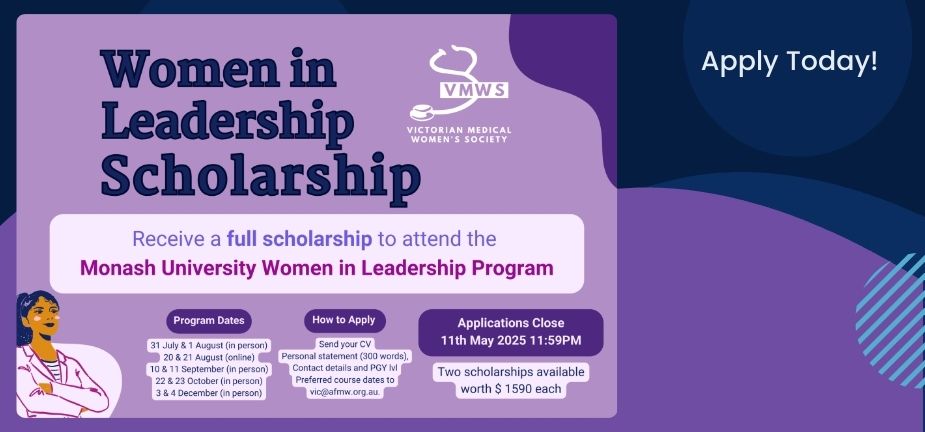QLD VP Dr Maria Boulton is speaking in this article (originally published RACGP newsGP) about the need for PPE fit testing and access for GPs. Mask fit testing is still not standard practice in Australia and most of us have to purchase our own.
Over the two year course of the pandemic, many GPs have added to this discussion from around the country, speaking of the fact that we are not ‘falling like flies’, simply because of the effort we each are making to keep ourselves and staff protected at our own expense, whilst delivering care to the community. This continues to be a primary care advocacy issue all around the country, two years into the pandemic, which is unacceptable, much like the lack of RAT tests.
New Australian research adds further evidence that more needs to be done to protect healthcare workers from aerosol spread.
Despite triage efforts, healthcare settings, including both general practices and hospitals, have been sites of COVID-19 transmission.
In a bid to keep both staff and patients safe, a number of vocal GPs have been advocating for greater support around access to personal protective equipment (PPE) and, more recently, guidance around the use of air filtration systems.
Now there is new research to back their calls.
Conducted by researchers at Monash University, the findings confirm that full PPE – including a fit-tested N95 mask – used in conjunction with a HEPA filtration system, offer the best protection to healthcare workers against viral aerosol exposure.
The experimental study, which has yet to be peer-reviewed, used a nebuliser to pump bacteriophage PhiX174 into a sealed clinical room for 40 minutes, testing three scenarios:
- A healthcare worker in full PPE (a surgical mask, gloves, gown and face shield)
- A healthcare worker in full PPE with a fit-tested N95 mask
- A healthcare worker in full PPE with a fit-tested N95 mask and a HEPA filter system in the room

In the first scenario, the findings showed significant infiltration, with over 200 virus particles detected in the nostrils, while the addition of a fit-tested N95 mask slightly reduced infiltration, with between 25–200 virus particles detected in the nostrils.
However, the third scenario, including both a fit-tested N95 mask and a HEPA filter system that cleaned the room volume 13 times per hour, was found to provide close to complete prevention, with 0–1 viral particles detected.
Lead author Dr Simon Joosten from the Monash University School of Clinical Sciences said the findings clearly highlight that the standard PPE strategy is not suitable to prevent aerosol transmission.
‘Air filtration and PPE work together,’ he told newsGP. ‘In this controlled setting, either of them used in isolation still results in significant contamination of the healthcare worker.
‘It really gets to the core of one of the lessons that we’ve all learned in the pandemic, which is you can’t really fix this problem with just one approach. PPE and air filtration are both key pillars of that layered approach, and vaccination’s obviously the third.’
Though the findings have yet to be published, senior management at both Monash Health and Epworth Health have taken immediate action on the data by purchasing a number of HEPA filters for hospital wards to reduce risk.
‘I haven’t done research that’s been this impactful this quickly; it’s been really gratifying and kind of crazy, to be honest,’ Dr Joosten said.
And while the research has been presented for hospital settings, he says the findings are ‘directly translatable’ for general practice, with the study’s scenario based on the setup of a closed clinical room with no natural ventilation.
‘So if you’re thinking about a room like a GP cubicle that doesn’t have a window, maybe has an air conditioner, that from a ventilation perspective is the worst case scenario,’ Dr Joosten said.
‘But even in that worst case scenario with incredibly high viral loads, our data shows that the strategy of an air filter and adequate PPE can protect the healthcare worker.’
Queensland GP Dr Maria Boulton, who has been advocating for GPs and practice staff to have access to fit-tested N95 masks for close to two years, told newsGP she was not surprised by the findings.
‘From the start of the pandemic it made sense to me to provide healthcare workers with the best possible protection – protection against airborne particles,’ Dr Boulton said.
‘Thousands of coal miners are fit-tested every year in NSW and Queensland and provided with N95 masks that fit them to use when required by their work.
‘I am disappointed that we are this far into the pandemic and the same cannot be said by GPs and GP staff … even though we are the frontline and have cared for patients throughout the pandemic.’
A factor that has added to the challenge is the delay in the role of aerosol spread in COVID-19 transmission being acknowledged, with the role only formally recognised by Australia’s Infection Control Expert Group (ICEG) in October 2020 and by the World Health Organization (WHO) in May 2021.
Dr Joosten says this has been a ‘painful lesson’ of the pandemic in Australia, which he largely attributes to historical misconceptions around aerosol transmission of respiratory illnesses dating back to the 19th century that have persisted to the present day.
‘In Australia, we spend 90% of our time indoors, but there’s no current regulatory controls on indoor air quality,’ he said.
‘It’s kind of astounding and I think that regulatory gap probably stems from the same historical misconceptions and misunderstandings in that respiratory illnesses are transmitted in stale indoor air.
‘[It’s] really set us back.
‘If we were very clear from the start that this is transmitted in the air that we breathe, I think we would have been able to act more decisively, and there’d be less confusion about what’s necessary to protect people.’
At her own practice, Dr Boulton has taken steps to ensure all staff are fit-tested, as well as investing in HEPA filters. She says with transmission of COVID-19 now widespread, the need to protect staff is even more pressing.
‘We need to keep our GP workforce at work so that we can continue caring for COVID patients in the community, care for the increase of patients with non-COVID presentations and continue rolling out COVID vaccines,’ she said.
But with most practices left with no choice but to source their own supply privately, Dr Boulton says practices face the added challenge of competing with governments and wholesalers who have greater buying power, which has been a ‘time consuming and expensive’ challenge.
‘One of the models of N95 masks that fit most of our staff is now impossible to source, [and] many of our suppliers are not able to deliver on orders placed in December and have given us refunds,’ she said.
‘This is why I advocated for Government to use their logistics and buying power to resource general practice and facilitate fit-testing. The same, predictable, issue is being played [out] with access to rapid antigen tests.’
Dr Joosten has witnessed this firsthand. Just one week after presenting his research findings to the Victorian Department of Health, the State Government invested $190 million into purchasing HEPA filters to fit out classrooms.
While both PPE and filtration systems do come at a cost, Dr Joosten notes that they are much more practical options in comparison to rebuilding infrastructure around ventilation.
Dr Boulton agrees, but says practices need support from all levels of government to be able to protect not only their staff, but vulnerable patients.
‘We need a long-term solution that will guarantee PPE stocks for Australian general practices,’ she said.
‘GPs and GP staff are frontline and continue to step up. Where would we be without them?’
Read the full article: racgp.org.au/newsgp/professional/fit-tested-ppe-and-hepa-filtration-best-protection
Associate Professor Magdalena Simonis AM is a Past President of the AFMW (2020-2023), former President of VMWS (2013 & 2017-2020) and current AFMW National Coordinator (2024-2026). She is a full time clinician who also holds positions on several not for profit organisations, driven by her passion for bridging gaps across the health sector. She is a leading women’s health expert, keynote speaker, climate change and gender equity advocate and government advisor. Magda is member of The Australian Health Team contributing monthly articles.
Magdalena was awarded a lifetime membership of the RACGP for her contributions which include past chair of Women in General Practice, longstanding contribution to the RACGP Expert Committee Quality Care, the RACGP eHealth Expert Committee. She is regularly invited to comment on primary care research though mainstream and medical media and contributes articles on various health issues through newsGP and other publications.
Magdalena has represented the RACGP at senate enquiries and has worked on several National Health Framework reviews. She is author of the RACGP Guide on Female Genital Cosmetic Surgery and co-reviewer of the RACGP Red Book Women’s Health Chapter, and reviewer of the RACGP White book
Both an RACGP examiner and University examiner, she undertakes general practice research and is a GP Educator with the Safer Families Centre of Research Excellence, which develops education tools to assist the primary care sector identify, respond to and manage family violence . Roles outside of RACGP include the Strategy and Policy Committee for Breast Cancer Network Australia, Board Director of the Melbourne University Teaching Health Clinics and the elected GP representative to the AMA Federal Council. In 2022. she was award the AMA (Vic) Patrick Pritzwald-Steggman Award 2022, which celebrates a doctor who has made an exceptional contribution to the wellbeing of their colleagues and the community and was listed as Women’s Agenda 2022 finalist for Emerging Leader in Health.
Magdalena has presented at the United Nations as part of the Australian Assembly and was appointed the Australian representative to the World Health Organisation, World Assembly on COVID 19, by the Medical Women’s International Association (MWIA) in 2021. In 2023, A/Professor Simonis was included on the King’s COVID-19 Champion’s list and was also awarded a Member (AM) in the General Division for significant service to medicine through a range of roles and to women’s health.










